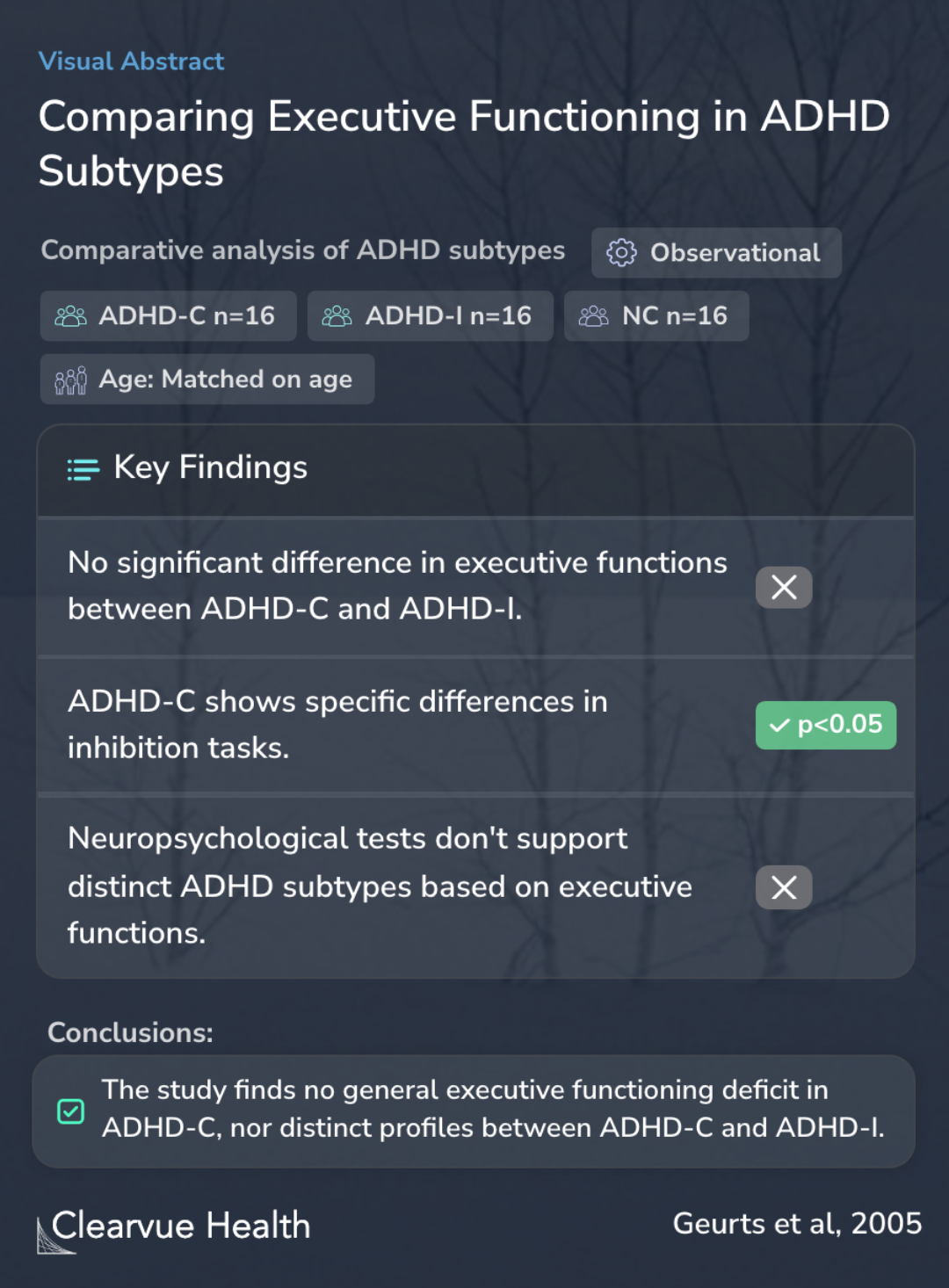ADHD subtypes: do they differ in their executive functioning profile?
Comparing Executive Functioning in ADHD Subtypes
Geurts HM, Verté S, Oosterlaan J, Roeyers H, Sergeant JA

Objectives
The study focused on understanding if children with two types of Attention Deficit Hyperactivity Disorder (ADHD), namely the combined subtype (ADHD-C) and the inattentive subtype (ADHD-I), show differences in their ability to control behavior, pay attention, and manage tasks (known as executive functioning). This is important because executive function is a key factor in how well someone with ADHD can perform daily activities. Fortunately, executive function can improve with interventions like exercise.
The present study was designed to investigate the hypothesis that children with Attention Deficit Hyperactivity Disorder combined subtype (ADHD-C) have a generalized executive functioning (EF) [Barkley, R. A. (1997). Behavioural inhibition, sustained attention, and executive functions: C...
Methods
The authors compared three groups of boys: those with normal development, those with ADHD-C, and those with ADHD-I. Each group had 16 boys. They were all of the same age and intelligence level, and some had other behavior disorders. This careful matching was done to ensure that the differences observed were due to ADHD types and not other factors.
We compared 16 normally developing boys with 16 boys with ADHD-C and 16 with ADHD-I on five EF domains. The boys were all matched on age, IQ, and the presence of oppositional defiant disorder (ODD)/conduct disorder (CD).
Results
Despite the detailed grouping and controls, the study found that ADHD-C children differed from normal controls only in tasks that required inhibiting responses, not in all areas of executive functioning. Surprisingly, children with ADHD-C and those with ADHD-I did not show major differences in their executive functions. This suggests that the two subtypes may not be as distinct in their executive functioning as previously thought.
Despite carefully diagnosed groups and methodological controls, the results do not support the EF-hypothesis of ADHD-C. Children with ADHD-C differed from normal controls (NC) on tasks related to inhibition; they did not exhibit EF deficits on all EF tasks. Children with ADHD-C also exhi...
Conclusions
In conclusion, the study suggests that the executive functioning profile of children with ADHD-C is not as broad as believed and does not clearly set them apart from children with ADHD-I. This finding is significant as it challenges the current understanding of the distinctiveness of ADHD subtypes in terms of executive functioning.
The results suggest that the executive functioning profile of children with ADHD-C is not generalized and does not differentiate them from children with ADHD-I. The neuropsychological findings do not support the distinctiveness of these subtypes.
Key Takeaways
Context
The Barkley et al. study highlights that executive function is a stronger predictor of job performance than IQ, especially in adults with ADHD. This underscores the importance of executive function, which the current study examines in children with ADHD. While Barkley et al. focused on adults, our study provides insights into the developmental aspects of ADHD and executive function in children.
Similarly, the Benzing et al. study shows that exercise can improve executive functions in children with ADHD, aligning with the notion that executive function, a key focus of the current study, can be enhanced. This broader context of research, including our study, indicates a growing understanding of how ADHD affects executive functions and how these can be improved through different means, such as physical activity.